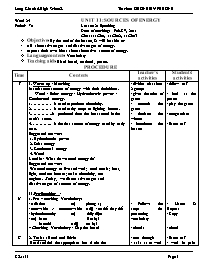Thiết kế bài dạy môn Tiếng Anh 11 - Unit 11: Sources of energy - Period: 70 - Lesson 2: Speaking

Objectives: By the end of the lesson, Ss will be able to:
- talk about advantages and disadvantages of energy.
- express their own ideas about alternative source of energy.
Language contents: Vocabulary
Teaching aids: Black board, textbook, poster.
Bạn đang xem tài liệu "Thiết kế bài dạy môn Tiếng Anh 11 - Unit 11: Sources of energy - Period: 70 - Lesson 2: Speaking", để tải tài liệu gốc về máy bạn click vào nút DOWNLOAD ở trên
Week 24 UNIT 11: SOURCES OF ENERGY Period: 70 Lesson 2: Speaking Date of teaching: Feb.8th, 2011 Class: 11Cba, 11Cbo2, 11Cbo3 Objectives: By the end of the lesson, Ss will be able to: talk about advantages and disadvantages of energy. express their own ideas about alternative source of energy. Language contents: Vocabulary Teaching aids: Black board, textbook, poster. PROCEDURE Time Contents Teacher’s activities Students' activities 5’ 6’ 8’ 15’ 10’ 1’ I. Warm up : Matching Match some sources of energy with their definitions. Wood / Solar energy / Hydroelectric power / Geothermal energy. 1 is used to produce electricity. 2 is used to dry crops or lighting homes. 3.is produced from the heat stored in the earth’s score. 4. .. is the first source of energy used by early man. Suggested answer: 1. Hydroelectric power 2. Solar energy 3. Geothermal energy 4. Wood Lead in: What do we need energy for? Suggested answer: We need energy to live and work; cook meals; heat, light, cool our houses; make electricity, run enginesToday, we discus advantages and disadvantages of sources of energy. II. Pre-Speaking : 1. Pre – teaching Vocabulary: - radiátion (n) phóng xạ - renéwable # nonrenéwable (adj) : có thể thay thế - hydroelectrícity (n) thủy điện - (to) harm làm hại hármful (adj) có hại * Checking Vocabulary: Slap the board 2. Task 1: Read and Stick: Read and tick the appropriate box A (for the advantages) or D (for disadvantage) Fossil fuels will be exhausted within a relatively short time. Geothermal heat is available only in a few places in the world. If the wind is not blow, there is no wind. Water power provides energy without pollution. A nuclear reaction releases radiation which is dangerous to our environment. Solar energy is not only plentiful and unlimited but also clean and safe. It’s expensive to build a dam for hydroelectric. Answer Keys: 1D 2D 3D 4A 5D 6A 7D III. While- Speaking : * Task 2:Talk with your friend about the advantages and disadvantages of using each alternative sources of energy, using the suggestions from Task 1 Example: A: I think / I believe that wind power can be an alternative source of energy. B: Why do you think / believe so? A: Because our major sources of energy are running out while the wind is abundant and unlimited. B: I know it is also clean and safe to the environment. However, it is not available when there is no wind. Useful language: Nuclear power / Solar energy / Water power / Gas / Petroleum / Oil / Coal / Geothermal heat FOR Enormous, plentiful, available Not spend a lot of money for treating it Never run out / unlimited / renewable Good for environment, not cause pollution Clean and safe Convenient /Cheap /Simple devices / Technology AGAINST Costly / limited Do harm to people’s health, the environment and natural habitat. Give out bad odor, produce an unpleasant smell Dependent on weather (can not operate when there is no wind / sunlight ) Harmful to environment / cause (air / water) pollution... IV. Post-Speaking: * Task 3: Work in groups Express your belief on the increasing use of alternative sources in the future, using the ideas from Task 2. Example: A: I believe that the use of solar energy should be the alternative source of energy in our country. B: I agree with you. It is the most feasible way to have solar energy in our country because Vietnam is a tropical country VI. Homework : Practice the dialogue at home Prepare the next lesson (Listening-p.128) - divides class into 2 groups - gives the rules of game - controls the game - declares the winner - introduces the lesson - Follows the steps for presenting vocabulary - checks - runs through - asks ss to work in pairs and read the table, then stick - checks and calls some ss say out theirs ideas - gives feedback - runs through - shows the dialogue - models and asks ss to repeat - gives the useful language - asks ss to substitute the underline words to make the conversation - asks ss to practice - Calls close pairs, open pairs - Gives the comments and marks - Runs through - asks ss to work in groups and express their ideas - gets feedback from ss - gives comments - Asks - follow to T - look at the poster - play the game - congratulate - listen to T - Listen & Repeat - Copy - check - listen to T - work in pairs and read the table, then stick - say out the ideas - take note - listen to T - look at the dialogue - repeat after T - take note - substitute the underline words to make the conversation - work in pairs and practice - speak in front of class - listen to T - listen - work in groups and express their ideas - give feedback - listen - listen
Tài liệu đính kèm:
 UNIT 11-SPEAKING-11.doc
UNIT 11-SPEAKING-11.doc





